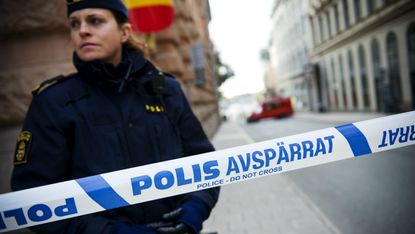Sweden plans grenade amnesty as attacks soar
Many of the explosive devices used by criminals have been smuggled in from the Balkans, experts say

Sweden is planning to hold an amnesty for grenades after a rapid rise in the number of incidents involving the hand-held explosive devices.
The government has put forward proposals for a three-month amnesty between October 2018 and January 2019, which will be voted on early next year, the Dagens Nyheter newspaper reports.
Although crime has fallen in recent years, the number of grenade attacks in Sweden soared from eight in 2014 to 52 in 2016, according to the Swedish Police Authority.
Subscribe to The Week
Escape your echo chamber. Get the facts behind the news, plus analysis from multiple perspectives.

Sign up for The Week's Free Newsletters
From our morning news briefing to a weekly Good News Newsletter, get the best of The Week delivered directly to your inbox.
From our morning news briefing to a weekly Good News Newsletter, get the best of The Week delivered directly to your inbox.
These incidents have “shocked a Nordic country that prides itself on safety, led to worries criminality is out of control and given political fodder to a resurgent far-right that blames immigrant gangs for the violence”, Reuters reported in 2015.
One attack involved an eight-year-old British boy, who was killed when a grenade was thrown into a Gothenburg apartment last year. Investigators believe the attack was gang-related and may have been linked to an underworld feud.
Many of the grenades have been smuggled in from the Balkans, Manne Gerell, a criminology researcher at Malmo University told Quartz earlier this year.
“They are surplus weapons from the civil war,” he said, but “it’s not as well established exactly how they’ve come in [to Sweden].”
Though the attacks “appear random,” Swedish authorities believe many to be linked with organised crime, Quartz reported.
“In most cases, either the suspect or the victim is associated with a criminal network,” Gerell said.
Create an account with the same email registered to your subscription to unlock access.
Sign up for Today's Best Articles in your inbox
A free daily email with the biggest news stories of the day – and the best features from TheWeek.com
-
 The World War Two experiments that made D-Day possible
The World War Two experiments that made D-Day possibleUnder The Radar Scientists performed gruelling tests on themselves paving the way for the iconic invasion
By Chas Newkey-Burden, The Week UK Published
-
 Is the Supreme Court about to criminalize homelessness?
Is the Supreme Court about to criminalize homelessness?Talking Points The court will decide if bans on outdoor camping are 'cruel and unusual'
By Joel Mathis, The Week US Published
-
 Fall into the groove at these delightful record stores
Fall into the groove at these delightful record storesThe Week Recommends Each one strikes its own chord
By Catherine Garcia, The Week US Published
-
 Sydney mall attacker may have targeted women
Sydney mall attacker may have targeted womenSpeed Read Police commissioner says gender of victims is 'area of interest' to investigators
By Julia O'Driscoll, The Week UK Published
-
 Why are kidnappings in Nigeria on the rise again?
Why are kidnappings in Nigeria on the rise again?Today's Big Question Hundreds of children and displaced people are missing as kidnap-for-ransom 'bandits' return
By Julia O'Driscoll, The Week UK Published
-
 Deaths of Jesse Baird and Luke Davies hang over Sydney's Mardi Gras
Deaths of Jesse Baird and Luke Davies hang over Sydney's Mardi GrasThe Explainer Police officer, the former partner of TV presenter victim, charged with two counts of murder after turning himself in
By Austin Chen, The Week UK Published
-
 How the idyllic Galapagos Islands became staging post in world drug trade
How the idyllic Galapagos Islands became staging post in world drug tradeUnder the radar Ecuador's crackdown on gang violence forces drug traffickers into Pacific routes to meet cocaine demand
By Harriet Marsden, The Week UK Published
-
 Armed gangs, prison breaks and on-air hostages: how Ecuador was plunged into crisis
Armed gangs, prison breaks and on-air hostages: how Ecuador was plunged into crisisThe Explainer Gangs launch deadly revenge after president declares state of emergency following escape of feared drug boss from prison
By Harriet Marsden, The Week UK Published
-
 Ecuador tips toward chaos amid prison breaks, armed TV takeover
Ecuador tips toward chaos amid prison breaks, armed TV takeoverSpeed Read New President Daniel Noboa authorized the military to 'neutralize' powerful drug-linked gangs after they unleashed violence and terror across Ecuador
By Peter Weber, The Week US Published
-
 Prague shooting: student kills 14 people at university
Prague shooting: student kills 14 people at universitySpeed reads Police believe suspect, who killed himself, may have shot his father before carrying out mass murder
By Arion McNicoll, The Week UK Published
-
 Ex-US diplomat confessed spying for Cuba to undercover agent, FBI says
Ex-US diplomat confessed spying for Cuba to undercover agent, FBI saysSpeed Read DOJ says former US ambassador Manuel Rocha perpetrated 'one of the highest-reaching and longest-lasting infiltrations of the United States government by a foreign agent'
By Peter Weber, The Week US Published